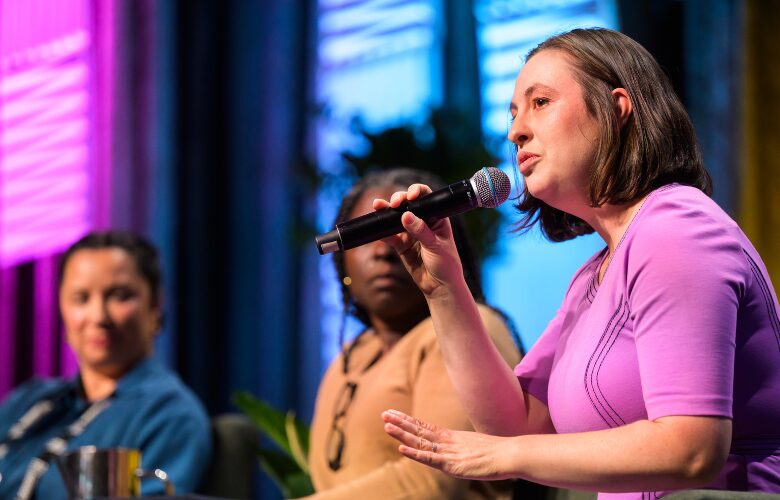The Future of Performing Arts Funding – APAP|NYC 2025

As the performing arts field navigates seismic shifts in its ecosystem—audience behaviors, economic conditions, labor models, and technological disruption—funders and field leaders are reckoning with what it truly means to support a healthy and equitable future. In the APAP|NYC 2025 session, “The Future of Performing Arts Funding,” a cohort of national funders and strategists gathered to reflect on the field’s challenges, share candid updates, and imagine a more collaborative, transparent, and just funding landscape. APAP is pleased to share the content of this important conversation through the article below and the session’s video recording, continuing its mission to equip the arts community with the necessary tools to engage in meaningful advocacy for the arts.
Opening the panel, APAP President and CEO Lisa Richards Toney emphasized thecritical interdependence of funders and arts organizations. As the field emerged from the pandemic-era crisis, she called for deeper alignment between funding institutions and the evolving needs of the sector—grounded in gratitude, transparency, and shared purpose.
Moderated by Lane Sugata of the Ford Foundation, the session built on a June 2024 national convening co-hosted by Ford, Mellon, Duke, NEA, and others. That event aimed to foster coordination and collective strategy among major performing arts funders—and this APAP panel extended that work to a broader public audience.
Alejandra Duque Cifuentes, Founder and Principal of ADC Consulting, shared findings from that convening, including adetailed mapping of funder assets and strategic orientations. The research highlighted a stark reality: the performing arts field is undercapitalized, over-reliant on unpaid labor, and deeply shaped by systemic inequities rooted in white supremacy and settler colonialism.
Yet, the data also revealed a collective will among funders to evolve—to move beyond cash grants and leverage intangible assets like political influence, space, networks, and expertise to support the sector. “This is a historic crossroads,” Duque Cifuentes said, “and funders have an opportunity—and responsibility—to act as better community members.”
Three national funders—Stephanie Ybarra (Mellon Foundation), Bahia Ramos (Wallace Foundation), and Dr. Ashley Ferro-Murray (Doris Duke Foundation)—offered updates on how their organizations are shifting in response to field needs.
Mellon Foundation nearly doubled its arts and culture budget over five years, from $79 million in 2019 to over $168 million projected in 2024. Ybarra emphasized a focus on social justice, intersectional equity, and supporting even the smallest organizations. She also defended the role of regranting in reaching communities Mellon can’t directly access.
Wallace Foundation is investing $107 million over five years in a long-term initiative centered on community well-being and equity in the arts. Ramos highlighted Wallace’s work with BIPOC-led organizations and regional intermediaries, acknowledging discomfort and “record-scratch moments” as part of the learning and shifting process.
Doris Duke Foundation is focusing its arts strategy on two pillars: abundant creativity and the intersection of performing arts and digital technology. Ferro-Murray spoke of plans to expand support for individual artists—including unrestricted awards and national advocacy campaigns around creative labor—as well as investing in artist-centered technology literacy and innovation.
All three funders emphasized collaboration, cross-program learning, and a willingness to take risks—even fail—in service of long-term sector health.
Throughout the session, panelists underscored the importance ofcoalition-building andshared frameworks—not just among funders, but with grantees and across disciplines.
Ramos reflected on the pandemic-era shift toward responsiveness and real-time learning, where funders dropped traditional gatekeeping processes to meet urgent needs. Ferro-Murray pointed to cross-sector conversations around AI and intellectual property as emerging points of connection and collective advocacy. Ybarra noted the power of informal, peer-to-peer knowledge exchange among foundation staff who come from the arts field.
“We’re not just here to write checks,” said Lane Sugata. “We’re here to solve the problem with you.”
The session closed with a fireside conversation between Lane Sugata and Dr. Maria Rosario Jackson, former Chair of the National Endowment for the Arts. Jackson offered a compelling vision of the arts as central to civic health, justice, and community well-being. She stressed the need for flexible metrics of impact that reflect a rebuilding moment—and acknowledged that with change comes discomfort.
“A hallmark of progress,” she said, “isa little bit of chaos.”
Jackson called on the arts ecosystem to widen its aperture—to see connections with health, housing, education, and democracy—and to collaborate more broadly. “None of the things we aspire to as a nation—justice, equity, opportunity—are possible without the arts.”
While the panel did not offer a singular solution, it surfaced clear priorities: center the artist, value process over product, build flexible infrastructure, and invest in trust-based relationships. Funders, organizations, and artists alike must reimagine roles, challenge outdated norms, and deepen their shared commitment to equity, creativity, and care.
As one attendee summarized,“The arts are not a nice-to-have. They’re a must-have. And the way we fund them should reflect that truth.”
Main image: Ashley Ferro-Murray speaking at Future of Performing Arts Funding session (Photo by Adam Kissick APAP)
Editor's Note: At StageLync, an international platform for the performing arts, we celebrate the diversity of our writers' backgrounds. We recognize and support their choice to use either American or British English in their articles, respecting their individual preferences and origins. This policy allows us to embrace a wide range of linguistic expressions, enriching our content and reflecting the global nature of our community.
🎧 Join us on the StageLync Podcast for inspiring stories from the world of performing arts! Tune in to hear from the creative minds who bring magic to life, both onstage and behind the scenes. 🎙️ 👉 Listen now!